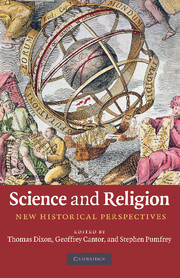Book contents
- Frontmatter
- Contents
- List of contributors
- Preface
- 1 Introduction
- PART I CATEGORIES
- PART II NARRATIVES
- PART III EVOLUTION AND CREATIONISM
- PART IV THE POLITICS OF PUBLISHING
- 9 A global history of science and religion
- 10 The Scopes trial beyond science and religion
- 11 Science, religion, and the history of the book
- PART V WAYS FORWARD
- Select bibliography
- Index
9 - A global history of science and religion
Published online by Cambridge University Press: 05 May 2010
- Frontmatter
- Contents
- List of contributors
- Preface
- 1 Introduction
- PART I CATEGORIES
- PART II NARRATIVES
- PART III EVOLUTION AND CREATIONISM
- PART IV THE POLITICS OF PUBLISHING
- 9 A global history of science and religion
- 10 The Scopes trial beyond science and religion
- 11 Science, religion, and the history of the book
- PART V WAYS FORWARD
- Select bibliography
- Index
Summary
The period between the rise and the fall of the British empire – that is, from the late eighteenth to the mid-twentieth centuries – witnessed an intense encounter between religious cultures and scientific ideas across the globe. Colonialism brought with it the movement of peoples and the imposition of new political structures worldwide. Many religious believers sought to redefine their faith in line with new scientific thinking. Given the violence of the imperial experience, it is tempting to imagine that different sciences and religions came into conflict during this period. Yet it is the argument of this chapter that this is a misguided view. The formal and informal British empire saw different intellectual traditions borrow ideas and forms of organization from each other. Different communities repositioned their histories and futures by drawing on both science and religion. There was an interrogation of beliefs about nature and life in the face of fresh ideas imported from other parts of the globe, and this interrogation often led to the synthesis, collaboration, and renewal of both the sciences and religion. Thus this story cannot be reduced to either a model of conflict or of complementarity.
This chapter presents a global history of science and religion for territories that came under British control or influence; it takes ‘global’ as a label of historical methodology indicating the analysis of broad patterns and connections across space, rather than a comprehensive history of all regions.
- Type
- Chapter
- Information
- Science and ReligionNew Historical Perspectives, pp. 177 - 197Publisher: Cambridge University PressPrint publication year: 2010
- 5
- Cited by



